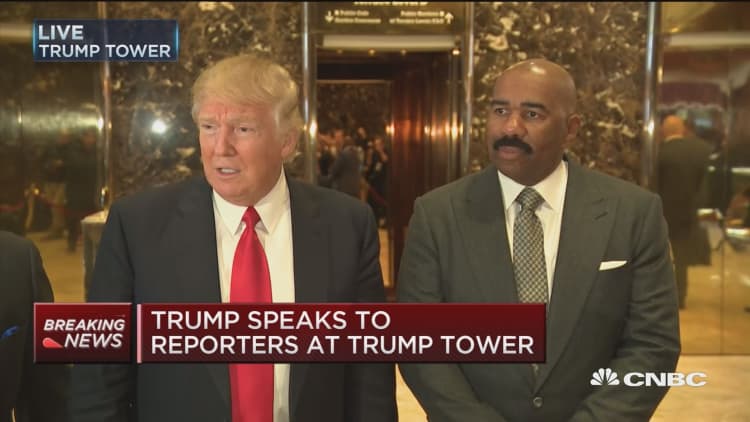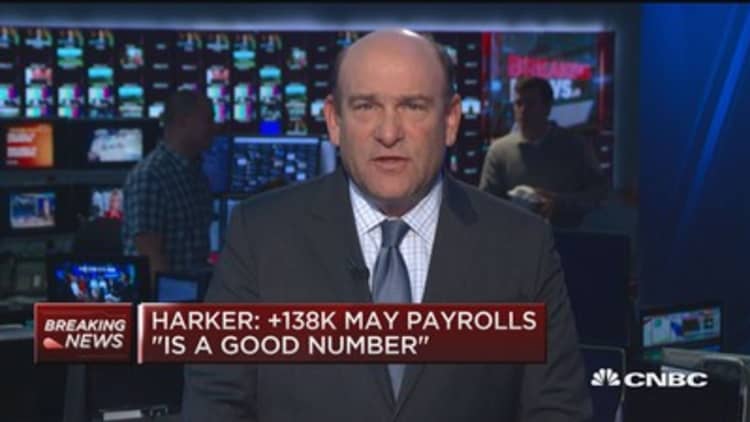The Trump administration has selected candidates for at least two of the three open positions on the Federal Reserve's Board of Governors, according to people with direct knowledge of the decision.
The expected nominees include Randal K. Quarles, a Treasury Department official in the George W. Bush administration, and Marvin Goodfriend, a former Fed official who is now a professor of economics at Carnegie Mellon University. The name of the third nominee could not be confirmed.
Read more from The New York Times:
Jobs report leaves Fed room to raise rates
We may be closer to full employment than it seemed. That's bad news.
Rough treatment of journalists in the Trump era
In picking Mr. Quarles and Mr. Goodfriend, President Trump is seeking to install conservative counterweights to the Fed's chairwoman, Janet L. Yellen. Both men have expressed reservations about the Fed's aggressive efforts to revive economic growth since the 2008 crisis.
Mr. Quarles would also become a leading figure in the administration's efforts to roll back financial regulation. He would be nominated to serve as the Fed's vice chairman for supervision, with responsibility for overseeing the Fed's regulatory responsibilities.
It is not clear when the administration intends to announce the nominations, according to the people, who requested anonymity to discuss confidential conversations. Until that happens, it remains possible that Mr. Trump could decide to reopen the search process.
Mr. Quarles and Mr. Goodfriend did not return calls requesting comment. "We have no announcement at this time," said Lindsay Walters, a White House spokeswoman.
Mr. Quarles, 59, is a managing director at the Cynosure Group, a private equity firm based in Salt Lake City. His wife's great-uncle is Marriner Eccles, the Fed's chairman from 1934 to 1948 and the namesake of the Fed's marble headquarters on the National Mall in Washington, where Mr. Quarles would have an office.
Mr. Quarles was a lawyer for the financial industry before joining the Bush administration in 2002, first as assistant secretary for international affairs and then as under secretary for domestic finance. After leaving the administration in 2006, he became a partner at the Carlyle Group before helping to found Cynosure in 2014.

At the Fed, Mr. Quarles would take the place of Daniel Tarullo, who led the Fed's push to tighten financial regulation after the 2008 crisis, though he was never formally nominated to serve as the vice chairman for supervision.
Mr. Quarles is regarded as significantly more sympathetic than Mr. Tarullo to the industry's concerns that regulation is overly restrictive, limiting economic growth.
In a 2015 interview with Bloomberg Television, he said some postcrisis changes in regulation "aren't well designed and were included for political rather than financial-regulatory reasons." In a 2016 opinion piece in The Wall Street Journal, Mr. Quarles argued that it was misguided to focus on the size of the largest banks.
One of Mr. Quarles's major tasks at the Fed would be overseeing the annual "stress test" of large banks, intended to make sure that they can weather a crisis.
But his influence would be constrained, at least in the short term, because Ms. Yellen played a key role in developing those regulations. Ms. Yellen's term ends in February 2018, creating the next Fed personnel decision confronting Mr. Trump.
Mr. Goodfriend, 66, is a leading figure among conservative economists who study monetary policy. He worked for more than 20 years as an economist at the Federal Reserve Bank of Richmond; for more than half of that time, he was the chief monetary policy adviser to the bank's president, a member of the Fed's policy committee.
He left the bank in 2005 to join the faculty at Carnegie Mellon University.
Mr. Quarles and Mr. Goodfriend have expressed support for the idea that the Federal Reserve should adopt a more formulaic approach to policy-making. House Republicans have proposed legislation that would require the Fed to articulate a policy rule — a mathematical approach to determining the level of interest rates — that would limit the role of human judgment in monetary policy.
"If you're going to be transparent in an activity like the Fed, you have to be much more rule-based in what you're doing," Mr. Quarles told Bloomberg Television in 2015. He described the Fed's current approach as "a crazy way to run a railroad."
Mr. Goodfriend endorsed that approach in March testimony before the House Financial Services Committee. He said adopting such a rule was necessary "to improve the discipline" of monetary policy and constrain inflation.
Mr. Goodfriend is also a critic of the Fed's asset purchases in the wake of the financial crisis. The Fed amassed more than $4 trillion in Treasuries and mortgage-backed securities. Mr. Goodfriend has said that the Fed should not purchase mortgage bonds, because doing so promotes economic growth in a particular sector — the kind of judgment that should be left to those who determine fiscal policy.
The Fed has operated in recent years without a full complement of seven governors. The board oversees regulatory policy, and the governors also hold permanent votes on the 12-member Federal Open Market Committee, which sets monetary policy.
By law, the Fed's board must include at least one person with community banking experience, and two of the people with direct knowledge of the process said that a number of candidates with that background have been interviewed in recent weeks. It is not clear, however, where a decision on filling the community-banking governor opening now stands.
Watch: Fed's Harper says job creation still strong


